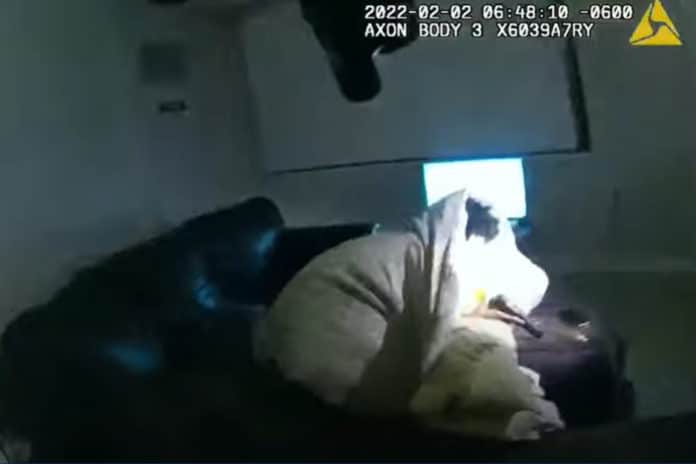Hennepin County Attorney Mike Freeman and Minnesota Attorney General Keith Ellison announced Wednesday that officer Mark Hanneman won’t face criminal charges for killing Amir Locke.
“Amir Locke’s life mattered,” the two said in a joint press release. “He should be alive today, and his death is a tragedy.”
Locke, 22, was killed during a Feb. 2 Minneapolis SWAT team raid when he emerged from underneath a blanket with a gun in his hand. Minneapolis police were executing a no-knock search warrant in connection to a St. Paul homicide investigation. Locke was not named as a suspect in the warrant.
BREAKING: Minneapolis releases body-camera video from yesterday's police shooting of 22-year-old Amir Locke. (WARNING: Video is graphic.) pic.twitter.com/HBMItXLo5f
— Alpha News (@AlphaNewsMN) February 4, 2022
Locke’s cousin, 17-year-old Mekhi Camden Speed, was arrested in connection to that investigation and charged with two counts of second-degree murder.
Ellison and Freeman, who collaborated on the case, were highly critical of no-knock warrants but concluded that the state “would be unable to disprove beyond a reasonable doubt any of the elements of Minnesota’s use-of-deadly-force statute that authorizes the use of force by Officer Hanneman.”
“With this legal standard in mind, after entering the apartment on a judicially authorized search warrant, the officers encountered an individual unknown to them, later identified as Amir Locke, who was moving around under a blanket and held out a firearm that was pointed in the direction of at least one officer,” the two said in their statement.
“This constitutes a specifically articulable threat. Officer Hanneman perceived that Mr. Locke’s movements and production of a firearm presented a threat of death or great bodily harm that was reasonably likely to occur and to which the officers had to respond without delay,” they added.
Their offices released two reports (a 44-page joint report and a 32-page expert report) elaborating on their decision.
“In reaching a decision about whether to file criminal charges in this case, it was not the role of our offices to evaluate whether the decision to seek a no-knock warrant was appropriate. It was our role to review whether there is sufficient admissible evidence to support a criminal charge,” they said.
“We have an ethical obligation as prosecutors to only bring criminal charges which are supported by sufficient admissible evidence to sustain a conviction. Under current law — and as awful as the circumstances of this tragedy are — there is not sufficient admissible evidence to support a criminal charge,” they continued.
Freeman and Ellison met with Locke’s family Wednesday morning prior to announcing their decision and sent “their deepest condolences to them during this incredibly difficult time.”
They called no-knock warrants a “highly risky” practice that poses “significant dangers to both law enforcement and the public.”
“The fact that it is standard practice for paramedics to stand by at the scene when no-knock warrants are executed speaks to the foreseeably violent nature of this law enforcement tool,” they said.
Cities like St. Paul have already banned the use of no-knock warrants and Mayor Jacob Frey is proposing a “full prohibition.”
Steve Sizer, a retired Minneapolis police lieutenant, defended the use of no-knock warrants as a necessary law enforcement tool when speaking with Alpha News in February.
“In today’s climate, I can’t understand why anybody wants to be a police officer. There’s no political support. There seems to be very little administrative support for the cops,” he said. “And then every time something happens, you run the risk of being charged with a crime for doing your job. It just has a very chilling effect on the whole profession.”
















